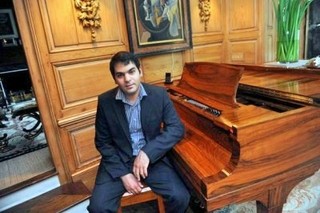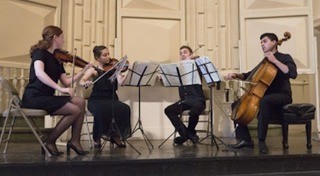|
Back
Making Mozart, Not War New York
All Souls Universalist Church
05/28/2015 -
Antonín Dvorák: String Quartet No. 12 in F major “American”, Opus 96
Wolfgang Amadeus Mozart: Quartet No. 14 in G Major “Spring”, K. 387, “Spring”
Paul Ben-Haim: Prelude for String Quartet
Taiseer Haddad: Middle Eastern Trilogy “Bladyat”: “Capriccio”
Polyphony Quartet: Feris Machour (Violin and viola), Revital Bendersky (Violin), Mahdi Saadi (Cello), Shir Chyat (Violin), Nabeel Abboud-Ashkar (Polyphony Foundation Co-Founder and Artistic Director)

N. Abboud-Ashkar (© Polyphony Foundation)
The traditional bromide that string quartets are “a dialogue among friends” might not quite be appropriate for the Polyphony Quartet, which gave an engaging concert last night in All Souls Church. “Friendship” doesn’t quite apply to relations between Jews, Muslims and Christians in the state of Israel. But on a personal–and musical–basis, the musicians of Polyphony have as much comradery as Daniel Barenboim’s Palestinian/Israeli Orchestra.
As a matter of fact, the founder of the Polyphony Foundation, Nabeel Abboud-Ashkar founded and ran the Barenboim-Said Music Conservatory in his home-town of Nazareth in 2006 until the name was changed to Polyphony Conservatory in 2012 A violinist himself, he founded the Polyphony Foundation in New York and Polyphony Education in Israel, which trains and educates young musicians of every belief. And outside of his work with Polyphony, Mr. Abboud-Ashkar also directs the Barenboim-Said conservatory and music programs in Ramallah, the Palestinian city on the West Bank.
And if that sounds needlessly complicated, remember that this is the Middle East. Whatever one’s allegiances, everything is needlessly complicated. Even music.

The Polyphony Quartet (© Jennifer Taylor)
Not that this apparently affected the young musicians of the Polyphony Quartet. Their ethnicities are Jewish, Arab Christian and Islamic. The composers they chose belonged to the Roman Catholic, Slavonic, Jewish and Islamic faiths in three centuries. And the music mainly had a blending belying their origins.
Admittedly, their venue, the grand Unitarian Church of All Souls, was not the right venue. Their Senior Minister, Galen Guengerich, is an esteemed figure in psychology, religion and ecumenical politics, but the church itself magnifies sounds, resonates in the wrong places, and has an air-conditioner which can resemble an oncoming Oklahoma typhoon.
That hardly made the opening Mozart “Spring” Quartet come out very spring-like. Mind you, the four players were well schooled, were effective and each solo instrument made some stunning sounds. But all the movements of the Mozart needed accents and enunciation, and instead we had a tranquil but not Mozartean blend. Yes, fugue, and the complex finale counterpoint were both played with better sounds (had they instinctively accustomed themselves to the audio of the church?), but it was not great Mozart.
The two short works which proceeded were wonderful. One could say that Paul Ben-Haim did for Israeli music what Dvorák did for Czech music. When he moved to Palestine from Germany in 1933 (a wise move indeed), he gave European-trained musicians old and new Israeli themes. Exactly what he did in the 1973 Prelude, a delicious Sephardic tune, with variations and that Fiddler on the Roof bumptiousness–yet ending with a softness and lovely dying theme by First Violin Feris Machour.
The second piece, an energetic Capriccio from the contemporary Arab composer Taiseer Hadded, had that same energy. Written for violin, viola and cello, it gave the Polyphony artists a color which was difficult to achieve with the full four players.
Yet the ending Dvorák “American” String Quartet can never fail, and the lovely beginning viola against the trembling strings was as youthful and spontaneous-sounding as the composer would have wished. The whole piece was written in a few days while Dvorák was visiting Iowa, and the Polyphony Quartet managed to bring in the birdsong of the scherzo (“that damned bird,” said Dvorák, who was bothered by the unstopping chirping), and the chorale of the local church.
The finale predated Honegger’s Pacific 231 by 75 years, but we still had that train rushing into the Iowa station, and the Polyphony Quartet gave it the right impetus.
Obviously, this group must be judged as much for their eclectic aims as their music. But because of this, one would imagine that composers with the same feelings–Philip Glass or Oswaldo Golijov, for instance–could be tempted to write something for their talents
Barenboim once said that music was hardly the way to bring warring parties together. Yet it certainly can’t hurt. Nor is Polyphony Quartet unique. That splendid journalist Meline Toumani mentions the Black Sea Orchestra, which apparently used Iranian, Iraqi, Greek, Turk, Israeli, Palestinian, Armenian and Azeri players. Now that is ecumenism. The Polyphony Quartet is not far behind, and one hopes, despite the dire politics of their homelands, their visits to America continue.
Harry Rolnick
|